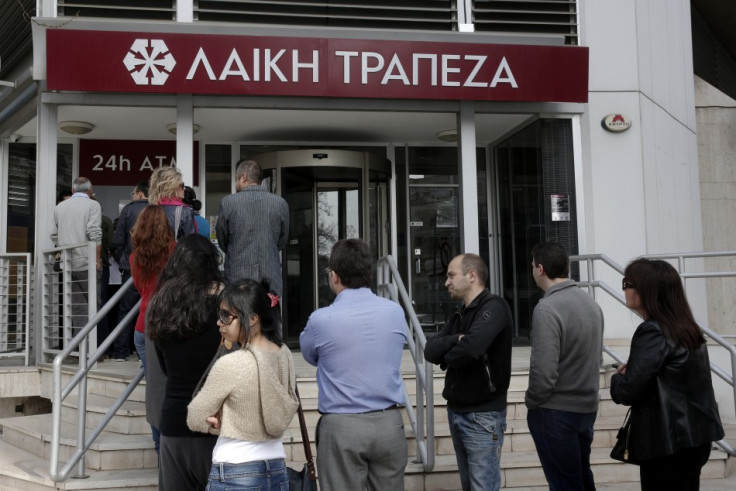Cyprus Crisis: ECB Sets Monday Deadline for Bailout Deal [VIDEO]

The European Central Bank has set an effective deadline for Cyprus to reach an agreement with its lenders before cutting of its only financial lifeline and potentially sending the country careening out of the Eurozone.
The ECB will keep its Emergency Liquidity Assistance (ELA) programme in place until Monday 25 March, the bank said on its website, after which it can only be extended if an agreement is reached with the European Union and the International Monetary Fund that "would ensure the solvency of the concerned banks".
The country's banks and stock exchange will remain closed until at least Tuesday, Cypriot officials said earlier today.
Minutes after the statement appeared, Eurogroup president Jeroen Dijsselbloem said Cyprus was a systemic risk to the eurozone and that he hopes an agreement can be reached that will place a greater burden on larger deposit holders in the country's banks. Speaking to the European parliament in Brussels, the Dutch finance minister said the upper limit of €10bn in financial support would not be lifted and that Cyprus needed to contribute the agreed €5.8bn portion of its financial rescue through the proposed bank levy.
Meanwhile, Cyprus' finance minister, Michael Sarris, remains locked in negotiations with Moscow over extending the terms and conditions on a €2.5bn loan arranged with Russia last year. Sarris told ReutersThursday that he hopes to reach a deal that would extend the loan by five years and reduce its interest rate from 4.5 percent to 2.5 percent. He said there was "work to be done" in reaching an agreement and that any financial support would be directed to his country's banks.
"The banks are the ultimate objective in any support we get, so it'll either be a direct support to the banks or the support that we get through other sectors will be channelled to the banks, because this is our biggest challenge to recapitalise the banks," he said.
Cypriot banks are, at present, surviving only through the ECB's ELA programme, which allows the central bank of Cyprus to continue lending to them but only with the permission of the Governing Council, which comprises the heads of the 17 central banks which use the single currency and a further six members of the ECB's Executive Board.
The Cyprus central bank can lend - at a higher rate of interest - to its commercial banks in exchange for collateral that includes Cyprus government bonds and treasury bills. It is meant to shoulder any potential losses on the loans by itself, and not to "pool" them among the other members of the Eurozone. However, Cyprus government bonds are not accepted by the ECB as acceptable lending collateral and have been rated as "junk" status by the major ratings agencies for several months.
The ECB's Governing Council can shut down the ELA lending if it feels the national central bank isn't able to absorb potential losses or is lending to domestic banks are that either technically or official insolvent.
"The alternative may be the 'nuclear option' of withdrawing support for the banking system and effectively forcing Cyprus out of the Eurozone," wrote Barclays strategist Michael Gavin in a client note. "An even more unappealing precedent for the Eurozone's governments."
Joerg Asmussen, and ECB Executive Board member from Germany, told Die Zeit magazine in an interview published Wednesday that the solvency of Cypriot banks "must be viewed as non-existent ... if there is no agreement soon on an aid programme that allows a quick recapitalisation of the banking sector."
Lawmakers late Tuesday unanimously rejected a rescue proposal that would have seen all depositors in the country's banks pay a portion of the €16bn needed to stabilize the sector and shore-up its public finances. The vote, which included 19 abstentions, was a humiliating blow to both newly-elected President Nicos Anastasiades as he attempts to navigate the twin demands of his Eurozone partners, who insist that Cyprus' savers contribute to region's fifth bailout, and his constituents, whom he promised to protect from raids on their bank deposits.
If Cyprus were to exempt savers within the €100,000 "insured" deposit threshold it would need to tax on the €38bn in accounts above that level at a rate of around 15 percent, according to Barclays' research, in order to reach the €5.8bn target required by the European Union and the International Monetary Fund before releasing the additional €10bn in bailout funds.
© Copyright IBTimes 2025. All rights reserved.



















